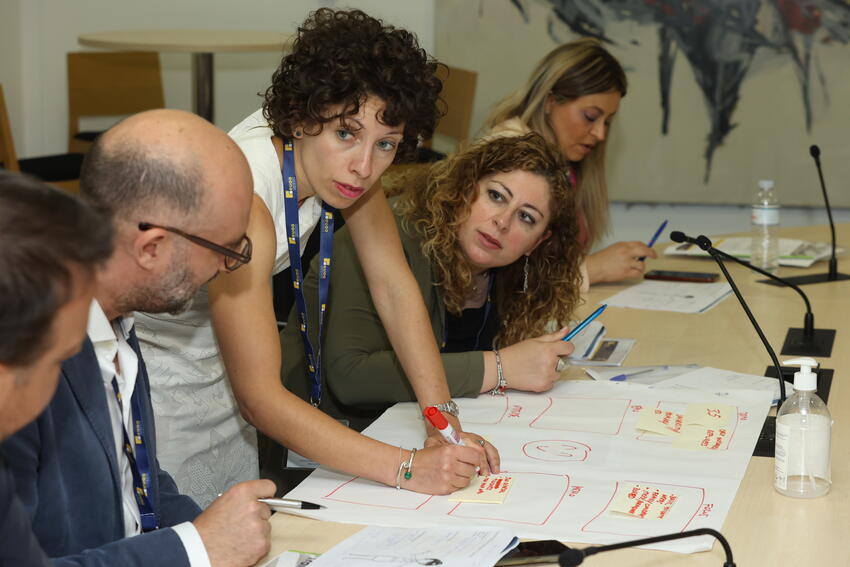What our learners say about the training they followed
Find out more about EUAA training
Visit the EUAA Learning Portal where you can find information about training including:
- a filterable catalogue
- key documents
- newsletters
- training plans
- featured videos
You can also consult the training catalogue on the EUAA website for a comprehensive summary of all the training modules and the languages they are available in. It also includes essential information on each module, such as the target learners, duration, learning outcomes, overview and aim. You will find information on the assessment strategy on the pages of training modules for which assessments are available.
Check if you are eligible to participate in EUAA training sessions
The main target groups for the EUAA’s training and learning activities are staff from EU+ countries’ asylum and reception authorities, including Member State experts who are deployed in the context of the EUAA’s operational support activities. Participation is extended, where possible, to other actors. The EUAA endeavours to maximise participation in its training activities. However, access to training remains at the discretion of the EUAA in accordance with the EUAA’s mandate and Member States’ training needs. We therefore invite you to respond to the questions using the interactive admissions procedures tool to find out if you are eligible to take part.

Definitions
An asylum-seeker is a person requesting international protection due to the risk of persecution or due to risk of being ill-treated or being subjected to other serious harm in his or her home country.
The Common European Asylum System (CEAS) is a framework of agreed rules which establish common procedures for international protection to ensure fair and humane treatment of applicants. The CEAS has been reformed with the new pact on migration and asylum which was adopted in April 2024.
The European Asylum Curriculum is made up of a wide range of modules which have been developed in close collaboration with experts from Member States and external experts with extensive knowledge and experience on the specific topics and integrate expertise from the EUAA's Asylum Knowledge Centre and Operational Support Centre. Training modules are reviewed by the EUAA Reference Group, whose members include experts from the European Council on Refugees and Exiles, the Office of the United Nations High Commissioner for Refugees and the European Commission.
To find out more about the EUAA mandate, you can consult Regulation (EU) 2021/2303 of the European Parliament and of the Council of 15 December 2021 on the European Union Agency for Asylum and repealing Regulation (EU) No 439/2010
The EUAA external cooperation strategy aims to support the full alignment of candidate and potential candidate countries with the norms and standards of Common European Asylum System and to assist other selected partner third countries in enhancing their asylum and reception system. The EUAA provides Member States with enhanced support in their resettlement, humanitarian admission activities, and complementary pathways for third-country nationals in need of international protection.
International protection means actions aimed at protecting the fundamental rights of a specific category of persons outside their countries of origin, who lack the national protection of their own countries. Under the European legal framework, this protection includes the granting of refugee status and subsidiary protection status.
The EUAA is mandated to rapidly mobilise resources and expertise in order to support Member States whose asylum and reception systems are under disproportionate pressure and to assist them in implementing their obligations within the framework of the CEAS. An integral part of the operational support offered is capacity building and training.
As an integral part of the CEAS, the EUAA has been mandated to develop the European Asylum Curriculum as part of the permanent support provided to EU+ countries. EUAA training gives a European perspective as all content is based on established common procedures and complements national training which may focus on the application within the national context.
A refugee is a person who has been recognised as being in need of international protection. According to the Geneva Refugee Convention, a refugee is a person who ‘owing to well-founded fear of being persecuted for reasons of race, religion, nationality, membership of a particular social group or political opinion, is outside the country of his nationality and is unable or, owing to such fear, unwilling to avail himself of the protection of that country’.
To find out more about roadmaps and other cooperation agreements you can visit the EUAA website page where the agreements between partner countries can be downloaded.
SOGIESC is an acronym for Sexual orientation, gender identity, gender expression and sex characteristics. People with diverse SOGIESC is an umbrella term for all people whose sexual orientations, gender identities, gender expressions and/or sex characteristics place them outside culturally mainstream categories.
On 4 March 2022, the Temporary Protection Directive (Council Directive 2001/55/EC) was activated to ensure the protection needs of millions of people fleeing the Russian invasion of Ukraine. It alleviated pressure on national asylum systems and ensured that people received harmonised rights across the EU, including accommodation, access to the labour market and housing, medical assistance and, in the case of children, access to state education.



